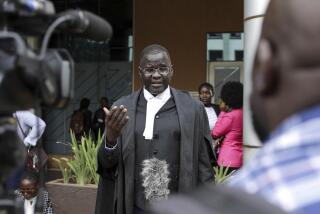Uganda Takes Up Abstinence Campaign
KAMPALA, Uganda â Itâs Saturday night at Makerere University and the âabstinence partyâ is in full swing around the campus swimming pool.
More than a thousand young men and women sway to the reggae sounds of local musicians and singers. Some dance. A few flirt. But the sexual tension ends there. At nightâs end, hundreds sign pledge cards vowing to shun sex until marriage.
âWeâre waiting,â says Sylvia Moos Muzaale, 25, a smiling library sciences major seated next to her boyfriend of three years. He gives a shrug that suggests heâs less comfortable with the decision, but says nothing.
The weekly bash is part of a burgeoning anti-AIDS campaign in this East African nation, where virginity is fast becoming a national obsession.
Billboards with the logo âAbstinence: You Can!â dot the capitalâs streets, encouraging men to search for virgins. âSomewhere out there,â one giant poster reads, âsheâs keeping herself for you.â A member of Parliament is offering scholarships for young women who undergo gynecological exams to prove their chastity.
Now AIDS activists are warning that the focus on abstinence, and a related backlash against condoms, is threatening Ugandaâs progress in combating AIDS. Prevalence rates here dropped from 18% in 1992 to 7% today in a country where 1 million have died from the disease and another 1 million are infected.
âAbstinence is fine for some, but not for everyone,â said Edith Mukisa, who heads Kampalaâs Naguru Teenage Center. âWhat about people that donât marry? What about poverty, which forces many young people to take sugar daddies or sugar mommies for money? Iâm afraid weâre going to have another boom in the HIV rate.â
Ugandaâs AIDS prevention campaign, launched in the late 1980s and considered one of the worldâs most successful, has fractured over its much-touted A-B-C strategy, which focuses on abstinence, being faithful and condoms.
Complaining that the A-B message was getting short shrift, religious groups and some politicians, with support from churches and conservative groups in the United States, declared war on the C camp.
âPeople act as if condoms are more important than food,â said Pastor Martin Ssempa, host of the campus abstinence parties and founder of Makerere Community Church, which preaches chastity to students. The pastor says he believes condoms encourage promiscuity and that condom promotion has gone too far, such as explicit how-to demonstrations in schools.
âIâm not anti-condom,â Ssempa said, although he acknowledged burning a batch on campus last year. âItâs a moral issue. I believe in quiet promotion of condoms to certain groups.â
Other critics have suggested that condoms cause cancer or have holes that allow the human immunodeficiency virus to permeate the devices. Some have even claimed that condoms were secretly infected with HIV by the U.S. to spread the disease in Africa.
Ugandan President Yoweri Museveni, who relied heavily on condom distribution in the past, shocked many by saying recently that condoms are ânot the ultimate solution.â His evangelical-leaning wife, Janet, who wants a national census to determine how many young people have had sex, suggested that condom promoters are racist because they believe âAfricans cannot control their sexual drives.â
Their contributions to the debate led to an avalanche of statements by other political leaders who declared condoms âun-Africanâ and only suitable for sex workers, truck drivers and those already infected with HIV.
âBecause of the stigmatization, those of us arguing for condoms were suddenly looked at as people who are immoral,â said Ugandan AIDS activist Beatrice Were, who is HIV-positive.
Straight Talk, a nonprofit youth group, built its name on providing frank advice about sex and condoms in newsletters, radio shows and classroom presentations. In the new climate, how-to demonstrations were canceled, and counselors donât mention condoms unless asked.
âThe conversation about sex is getting constrained,â said Catherine Watson, communications director for the group. âWe donât raise the âCâ issue.â
Many blame the government for a recent condom shortage, sparked when 45 million government-issued condoms were recalled. Users complained of a bad smell, and tests found defects.
Health clinics and AIDS groups scrambled to replace supplies, but condom prices tripled. Over the last 12 months, only 30 million condoms have been distributed nationwide, compared with 100 million in recent years.
Government officials defend their response.
âThere is no condom shortage,â said State Minister for Health Michael Mukula, adding that a supply of 20 million is being distributed nationwide. He said his ministry continues to promote condoms and is preparing to distribute them to vending machines in hotels, truck stops and public restrooms.
But a representative for a truck drivers union said distribution of free condoms along the Trans-African Highway had ceased a year ago and had not resumed. âI keep hearing about 20 million or 30 million new condoms, but we havenât seen them,â said Alex Menyha, who represents private-sector trade groups.
For young people, the debate has been particularly dangerous, some experts say.
âThe more confused young people are, the more they put themselves at risk,â said Mukisa, the teen center head. âItâs an issue of mixed messages.â She sees an increase in homosexual behavior, oral sex and anal sex among young people who tell her, in anonymous surveys, that theyâve turned to such practices in an effort to âstay virgins.â
Itâs too early to determine the effect of these changes on AIDS prevalence rates. Earlier this year, the Health Ministry reported that a study had found the national rate was 7%, up from the previous estimate of 6.2%. Officials attributed the increase to differences in data-collection methods, not changes in behavior.
Many AIDS officials blame the abstinence push on pressure from U.S. conservative groups, such as the Heritage Foundation and Focus on the Family, and on the Bush administration program the Presidentâs Emergency Plan for AIDS Relief, or PEPFAR.
The five-year, $15-billion program has dramatically increased U.S. funding for AIDS work in Africa, but it includes a hefty earmark for programs that deal exclusively with abstinence and faithfulness. Two-thirds of its AIDS prevention budget must be spent on the A-B of A-B-C.
One casualty so far is condom-distributor Population Services International, which lost its funding recently after being attacked by Ssempa and U.S.-based Focus on the Family.
Last month, the United Nationsâ special envoy on fighting AIDS in Africa attacked the U.S. influence.
âThe condom crisis in Uganda is being driven and exacerbated by PEPFAR and by the extreme policies that the administration in the United States is now pursuing in the emphasis on abstinence,â said Stephen Lewis, former Canadian ambassador to the U.N.
U.S. officials insist that they have not interfered in Ugandaâs AIDS debate and note that the programâs funding for abstinence is part of a massive increase in overall aid. U.S. AIDS assistance in Uganda is about $150 million a year, more than the total spent between 1986 and 2001.
âThere is no grand conspiracy where the U.S. government is convincing Ugandans not to promote condoms,â said William Fitzgerald, deputy chief of mission in Uganda and head of the program. âThere is plenty of money to be devoted to A-B-C across the board.â
The Rev. Canon Gideon Byamugisha, an Anglican clergyman who has advocated AIDS awareness since his own HIV diagnosis in 1992, said he fears that AIDS patients will pay the price.
âItâs a misplaced debate,â he said. âIf you have limited energy and resources, it shouldnât be spent on something like this.â
More to Read
Sign up for Essential California
The most important California stories and recommendations in your inbox every morning.
You may occasionally receive promotional content from the Los Angeles Times.










